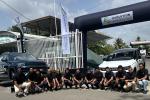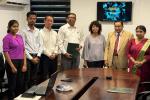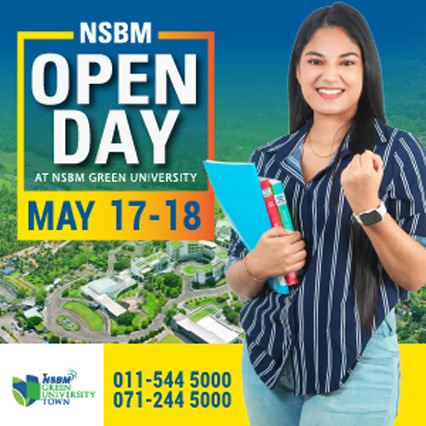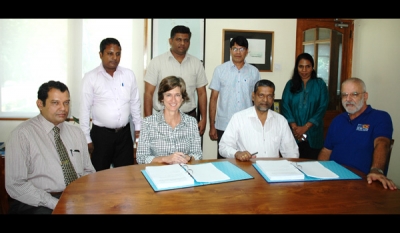The Rs. 142 million contract for the construction of the hatchery in Tharmapuram was signed between the FAO and Finite Lanka (Pvt) Ltd on 27th November at the FAO Country Office in Colombo.
With the Sri Lanka Government’s vision for the country to become a leader in South Asia in sustainable utilisation of aquatic resources for fisheries development, the ten year development plan of the Ministry of Fisheries and Aquatic Resources Development has given high priority for the development of the aquaculture sub-sector.
Marking a new chapter in the long history of cooperation between the EU, the FAO and the Government of Sri Lanka in the fisheries sector, this project seeks to fulfill the national requirement for the development of marine finfish farming in the country.
Speaking on the commencement of the project, Ms. Libuse Soukupova, Head of Development Cooperation of the European Union said, "The return of normalcy to the North and East has revealed large areas of potential sites for finfish farming which have become available with more individuals and firms showing interest in aquaculture.
Our hope is that the hatchery will benefit coastal communities and lend to income generation and elevation of their living standard".
The availability of good quality water, stable sea, water depth as well as the active participation of fisher families in the area, were considerations in selecting the two hectare plot of land in Tharmapuram for the finfish hatchery by the National Aquaculture Development Authority (NAQDA).
Once the construction is completed, the hatchery will be operated by the National Aquaculture Development Authority (NAQDA) at the initial stages and thereafter run as a public-private sector partnership.
Finfish hatcheries are operative throughout South East Asia, producing a range of marine finfish including milk fish and several grouper species.
The backbone of any aquaculture farming is the availability of required seeds. Sri Lanka does not possess adequate facilities to produce sufficient amount of finfish with the existing technology to meet the demand in the national and international markets.
Therefore, in order to harness the potential for marine finfish farming, the project seeks to adopt technologies for breeding and seed production, while also disseminating breeding technology to private entrepreneurs.
Once construction of the hatchery is complete, operations will take place in 5 production cycles annually, yielding an annual production of 5 million fries or 4 million fingerlings, making it the largest marine finfish hatchery in Sri Lanka.
The objective of the project is also to help Sri Lanka seek out market opportunities and produce sufficient amount of finfish to meet the demands of the national and international markets.
While marine finfish can be exported to the EU, USA and South East Asian countries there is also a market for the produce locally, particularly in the hotels and restaurants.
The establishment of the hatchery at Tharmapuram will facilitate the development of aquaculture in the Eastern Province, where fingerlings can be provided to fishers to further embark on marine pen, cage or pond culture.
It will also contribute to national fish production along with the freshwater hatcheries operating in Udawalawa, Dambulla, Iginiyagala and Iranamadu.
NAQDA projects the total aquaculture production of the country to increase by around 5% with an increase in the country’s export earnings through the operations of the Tharmapuram finfish hatchery.
Commenting on the construction of the Tharmapuram hatchery, Giuseppe Bronzoni, FAO’s Chief Technical Advisor on SDDP said "The investment of EU funds in the construction of the Finfish hatchery in Batticaloa will create conditions for a radical increase in the marine fish culture and marketing, directly reflecting in better income and better protein intake for the beneficiary population.
The FAO-NAQDA partnership is longstanding and solid. Together we will ensure a high quality Finfish hatchery complex".
The EU-SDDP with a total financial envelope of EUR 60 million aims at supporting the Government of Sri Lanka’s thrust for economic and social development in 7 conflict-affected districts covering half a million people.
Within the framework of the EU-SDDP, FAO aims at increasing income generation among vulnerable rural population by supporting agriculture, livestock and fishery economic activities, rehabilitating irrigation tanks and other infrastructure facilities and strengthening producers groups and Government institutions to enhance sustainable and profitable livelihoods.
Photo caption
1.) Beth Crawford - FAO Representative (Sri Lanka) and A.G.M Bogahawatta (Managing Director – Finite Lanka (Pvt) Ltd.), sign contract for construction of marine Fin Fish Hatchery in Tharmapuram, Batticaloa as Tissa Vithanage (Aquaculture Engineer – NAQDA) looks on.
2.) Seated L-R: Tissa Vithanage (Aquaculture Engineer – NAQDA), Beth Crawford - FAO Representative (Sri Lanka), A.G.M Bogahawatta (Managing Director – Finite Lanka (Pvt) Ltd.), Giuseppe Bronzoni (Chief Technical Advisor – FAO SDDP)
Standing L-R: W.R Dilhan Samarasinghe (SQS – Finite Lanka (Pvt) Ltd.), Susantha Attanagoda (Operations Officer – FAO SDDP), Dr.D.Wijeratne - Assistant FAO Representative (Programmes), Rohini Singarayer (Project Manager – FAO SDDP)
























